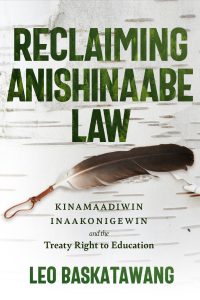There are five books on the 2024 J.W. Dafoe Book Prize shortlist and today we’re going to highlight Ed Broadbent’s Seeking Social Democracy: Seven Decades in the Fight for Equality (ECW Press).
Ed Broadbent died in January 2024, so here’s a Q&A with his collaborators, Jonathan Sas, Luke Savage and Frances Abele.
What were your goals for this book?
 Jonathan Sas: One of the many inspirations for undertaking the book was the encouragement of Ed’s late partner, the great social theorist Ellen Meiksins Wood. Ellen wanted to ensure that Ed’s incredible contributions to public life were given their due. So a key goal was to capture those contributions: in the realm of ideas and democratic leadership and engagement.
Jonathan Sas: One of the many inspirations for undertaking the book was the encouragement of Ed’s late partner, the great social theorist Ellen Meiksins Wood. Ellen wanted to ensure that Ed’s incredible contributions to public life were given their due. So a key goal was to capture those contributions: in the realm of ideas and democratic leadership and engagement.
Luke Savage: Quite simply, to record and capture the astonishing breadth and scope of Ed Broadbent’s thought and to chronicle his remarkable life and career.
Frances Abele: I believed that Canada had come to a moment when it was important that we have a discussion of the goals of social democracy and their relevance to the 21st century. Ed shared this concern, and I think all of us felt a responsibility to contribute in a positive way to public discourse.
What have you learned about your process while working on this project? Or is every project unique…
JS: The dialogical element of this book, the exchanges over many months with Ed that form the basis of the chapters, was tremendously generative. It allowed Ed to look both forward and back, to reflect, to interrogate, to clarify.
LS: One thing this project underscored for me was that the structure of ideas and narratives gradually reveal themselves to you through an intuitive process. You can try to organize your thoughts using templates and other things, but the only means to find your way with something big and complex is to sit with the ideas and the text, talk them over with your collaborators again and again, and keep working away.
FA: I found the collaborative writing process, in which all of us contributed questions and discussed answers, to be deeply satisfying and quite different from any other writing I have done.
What books were important to you while you were writing this book? Who/what are your influences?
JS: Thinking the Twentieth Century by historian Tony Judt was an important template for the form and structure of the book. In each chapter, other key sources were invaluable. Rosemary Brown’s own memoir, for example, and her reflections on Ed and the leadership race she lost to him, helped bring rich and personal analysis to a key moment in time.
LS: Because of the unconventional format used in our book — autobiographical essays from Ed followed by exchanges between him and the three of us — there were few templates available. One inspiration, insofar as the format was concerned, was a book by the late historian Tony Judt called Thinking the Twentieth Century, which in quite an innovative way wove together biography and history.
FA: We were all inspired by the format of Tony Judt and Timothy Snyder’s Thinking the Twentieth Century. I also found myself reading into the history of social democratic thought in Canada, as presented by the political generation before Ed and contemporary writers like Larry Savage, Alan Whitehorn, David McGrane, Roberta Lexier, Stephanie Bangarth, and others. Also important was the substantial work by Canadian labour historians, especially Pamela Sugiman and Carmela Patrias.
Tell me a bit about why you write about “Canada, Canadians and the nation in international affairs.” Why is it important to you?
JS: Ed Broadbent was a deeply committed internationalist. Not only was he very involved with and influenced by a global alliance of socialist and social democratic parties as vice president of the Socialist International while he was leader of the NDP, but after he left politics, he dedicated his talents to advancing social and economic rights as president of Rights and Democracy. Ed had a sharp vision for the role of Canada in the world that was anchored in clear values about rights, justice, and equality that transcended borders.
LS: For historical reasons, Canadian politics and society are quite unique. I think this fact is often underappreciated by Canadians themselves but, speaking as someone who does a fair bit of writing about the goings on of other English-speaking countries, it’s been my experience that it is wildly underappreciated by those elsewhere. Even many of my most politically informed and engaged friends and colleagues in Britain and America had never heard of Ed Broadbent. Along with much else, I hope this book will change that.
FA: Canada is fairly small, very open economy, prosperous, and dependent upon both immigration and trade for continued well-being. Internationally, we have been able to play a positive and important role at different junctures — for example, in drafting the Universal Declaration of Human Rights, in negotiating the Law of the Sea Convention, and in the formation of the Arctic Council. These are all measures that advanced peace and an international rules-based order. Ed saw Canada playing such a role, and in his career, also sought to combat the international forces of neoliberalism that were causing much misery in less prosperous parts of the world.
What are you reading right now? What are you writing right now?
Jonathan Sas: I have just read the brilliant East West Street by Philippe Sands, a masterful political and personal history of the key figures behind the enshrinement of crimes against humanity and genocide in international law. I have just begun Jhumpa Lahiri’s excellent novel The Lowland. I am currently writing about the twin fracturing of 1) the neoliberal consensus around markets, and 2) the liberal “rules-based international order.”
Luke Savage: Reading: Hilary Mantel’s remarkable 1992 novel about Maximilien Robespierre, Georges Danton, Camille Desmoulins, and the French Revolution — A Place of Greater Safety. Writing: A long-form historical essay about the 1937 Flint Sit-Down Strike.
Frances Abele: Tony Judt, The Burden of Responsibility: Blum, Camus, Aron, and the French Twentieth Century; Hisham Matar, A Month in Siena; Gail Bowen, The Legacy. Oh, and Ed Broadbent, Le temps d’agir — we did not get to it when we were working on the book. Ed wrote a lot! Writing: a grant application and a book chapter on building a third order of Indigenous government in Canada.
The winner of the J.W. Dafoe Book Prize, now valued at $12,000, will be named June 10.
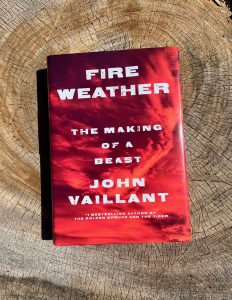 To engage Canadians in their own history, and to connect that history to our petroleum-powered — i.e., fire-powered — civilization and, from there, to the increasing flammability of our country, and our planet.
To engage Canadians in their own history, and to connect that history to our petroleum-powered — i.e., fire-powered — civilization and, from there, to the increasing flammability of our country, and our planet.


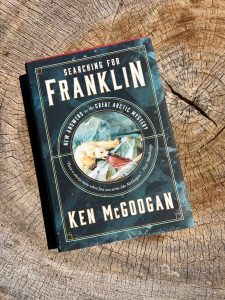
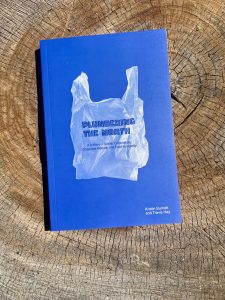
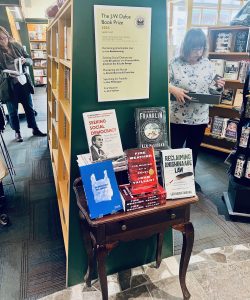
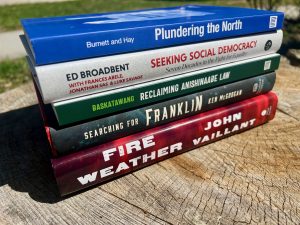 Ed Broadbent with Frances Abele, Jonathan Sas and Luke Savage.
Ed Broadbent with Frances Abele, Jonathan Sas and Luke Savage. 
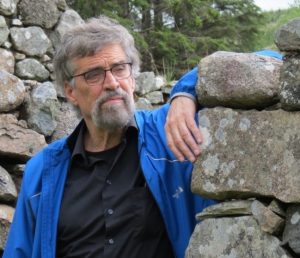

 Perrin also shares insights from others on the frontlines, including prosecutors and defence lawyers, police chiefs, Indigenous leaders, victim support workers, corrections officers, public health experts, gang outreach workers, prisoner and victims’ rights advocates, criminologists, psychologists, and leading trauma experts. Bringing forward the voices of marginalized people, along with their stories of survival and resilience, Indictment shows that a better way is possible.
Perrin also shares insights from others on the frontlines, including prosecutors and defence lawyers, police chiefs, Indigenous leaders, victim support workers, corrections officers, public health experts, gang outreach workers, prisoner and victims’ rights advocates, criminologists, psychologists, and leading trauma experts. Bringing forward the voices of marginalized people, along with their stories of survival and resilience, Indictment shows that a better way is possible.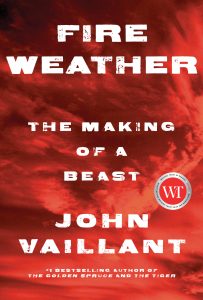
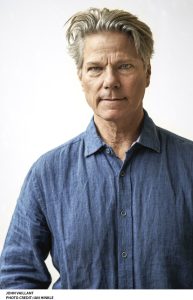 With masterly prose and a cinematic eye, Vaillant takes us on a riveting journey through the intertwined histories of North America’s oil industry and the birth of climate science, to the unprecedented devastation wrought by modern forest fires, and into lives fore
With masterly prose and a cinematic eye, Vaillant takes us on a riveting journey through the intertwined histories of North America’s oil industry and the birth of climate science, to the unprecedented devastation wrought by modern forest fires, and into lives fore